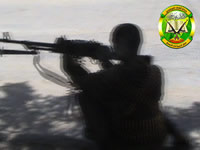|
|
|
Image of a Shabaab fighter from the terror group’s website. |
An al Qaeda commander from Yemen who led a group of foreign fighters battling the Somali government and African Union forces has been reported killed in Mogadishu.
The commander, Rajah Abu Khalid, was reported to have been critically wounded during heavy fighting in the Somali capital on Saturday. Khalid was moved to a Shabaab-run hospital in the town of Jowhar, north of Mogadishu, where he died, a commander of the al Qaeda-linked Shabaab terror group told Sunatimes.
A Somali commander confirmed Khalid’s death, and said he was among 13 foreign fighters killed during heavy fighting in the capital. Over the weekend, 25 people have been killed in Mogadishu in clashes between Shabaab and African Union and Somali forces. Both the Somali government and Shabaab claimed victory in the weekend’s fighting.
Khalid is said to have replaced Abu Musab, another foreign Shabaab and al Qaeda leader who was killed during fighting in Mogadishu several months ago.
Background on Shabaab’s links to al Qaeda
Shabaab merged with al Qaeda in November 2008, after requesting to join the international terror group in September of that year. Since then, top al Qaeda leaders Osama bin Laden, Ayman al Zawahiri, and Abu Yayha al Libi have praised Shabaab in propaganda tapes and encouraged the group to carry out attacks against the Somali government, neighboring countries, and the West. In late 2009, Osama bin Laden appointed Fazul Abdullah Mohammed to serve as al Qaeda’s operations chief in East Africa; the announcement was made at a ceremony in Mogadishu that was attended by Ahmad Godane Zubayr, Shabaab’s spiritual leader.
Over the past several years, al Qaeda commanders have taken over some of the top leadership positions in Shabaab. Fazul Abdullah Mohammed, who was indicted for his involvement in the 1998 attacks in Kenya and Tanzania along with Osama bin Laden, served as Shabaab’s top intelligence official before replacing Saleh Ali Saleh Nabhan as Shabaab’s top military leader.
Other foreign al Qaeda operatives hold top leadership positions in Shabaab. Shaykh Muhammad Abu Fa’id, a Saudi citizen, serves as a top financier and a “manager” for Shabaab. Abu Musa Mombasa, a Pakistani citizen, serves as Shabaab’s chief of security and training. Mahmud Mujajir, a Sudanese citizen, is Shabaab’s chief of recruitment for suicide bombers. Abu Mansour al Amriki, a US citizen, serves as a military commander, recruiter, financier, and propagandist. And Issa Osman Issa, a Kenyan, serves as a top al Qaeda recruiter and military strategist for Shabaab. [For more information on al Qaeda’s involvement in Somalia, see LWJ report, Al Qaeda leaders play significant role in Shabaab.]
Al Qaeda’s central leadership, which is based in Pakistan, recently instructed Shabaab to downplay its links to the terror group but to continue to target US interests in the region, a senior US intelligence official who closely follows al Qaeda and Shabaab in East Africa told The Long War Journal.
Shabaab is considered by some US military and intelligence officials to be one of al Qaeda’s most successful affiliates. Shabaab, along with its sometime ally, sometime rival Hizbul Islam, has taken control of much of southern and central Somalia after waging a terror insurgency against Ethiopian forces and the UN-backed Transitional Federal Government.
Last spring, Ethiopian forces withdrew from Somalia under fire and were replaced by some 6,000 African Union peacekeepers from Uganda and Burundi. The fractured and weak central government and African Union forces currently control pockets within Mogadishu and little else.
Outside of Mogadishu, the government wields little influence. Shabaab and Hizbul Islam currently control almost all of the southern provinces and many of the central ones as well.
Shabaab has emulated al Qaeda’s tactics, particularly the use of suicide bombings and terror assaults. The terror group has carried out 25 major suicide attacks in Somalia since September 2006, when the Islamic Courts Union usurped control of the government (the Islamic Courts Union was ousted from power in an invasion by Ethiopian forces in December 2006). Several of the attacks have been carried out by American and British citizens who had left their home countries to join Shabaab.
Shabaab has also executed a suicide attack outside Somalia’s borders: the July 11, 2010, double suicide attack in Kampala, Uganda, that killed 74 people. The suicide cell that carried out the attack is called the Saleh ali Nabhan Brigade and is named after the al Qaeda leader who served as the military commander for Shabaab before being killed in a US special operations raid in September 2009.









1 Comment
Surely it must be obvious by now that the Yemenis fund and operate the Somalis as a mercenary force.
Consequently, we must stop any further immigration from either Somalia or Yemen – – it’s just too dangerous.
Beyond that, Somalis are all over the crime blotter where ever they settle — w-a-a-y beyond normal crime statistics.
The reasons may be many but the result is the same: they don’t fit in — and can’t make a living. Soon, they drop out of society and form their own sub-culture of resentment and rejection.
It must be galling to submit to our female welfare clerks and jump through the documents required for assistance. Back home, they’d just grab a gun and go for it.
As tough as it is in Somalia — an American prison is no picnic. Not being able to read and write — in any language — and having never attended any school of any kind — Somalis are not going to be a happy fit in America.
And then there’s the impulse to jihad. AQ is already working the Somali angle for getting suicide troops into the States. All in all, it’s too risky for America.
Should a rash of attacks occur due to Somalis — the counter-reaction would be impossible to contain.